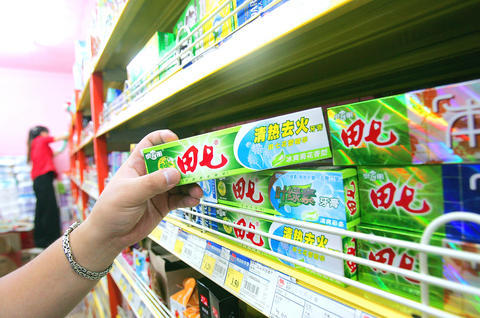China, a traditional source of cheap goods, has become a top exporter of tainted and dangerous products to the US, triggering concerns among consumers and regulators.
Reports of tainted pet foods, dangerous toys, fake drugs, toxin-coated monkfish and cosmetics, drug-laced frozen eel, illicit pesticide-laden mushrooms and other products have led to recalls and bans and potentially more stringent import and food safety laws.
Thousands of cats and dogs died recently after eating food made from wheat gluten spiked with melamine, a chemical used in fertilizers, prompting one of the largest pet food recalls in US history.

PHOTO: AP
Chinese toothpaste has also been blacklisted, following fears it may contain a potentially deadly chemical reportedly found in tubes sold in Australia and elsewhere.
The concerns were compounded by the recall last week by a US company of 1.5 million of the wildly popular "Thomas and Friends" wooden train toys manufactured in China coated with potentially poisonous lead paint.
Chinese-made fireworks for the July 4 US Independence Day celebrations have also made it onto the blacklist, with reports that at least two types have been recalled amid worries they could "travel in unexpected and dangerous directions" and pose "special hazards to eyes and bystanders."
"I think we have reached a point unfortunately where `made in China' is now a warning label in the US," said Democratic Senator Richard Durbin, a top campaigner in the US Congress for tighter food safety laws.
Durbin and Senator Rosa DeLauro held joint talks with US Food and Drug Administration (FDA) Commissioner Andrew von Eschenbach and Chinese Ambassador Zhou Wenzhong (周文重), in Washington over the contaminated shipments of food products from China.
They secured a commitment from the Chinese government and the FDA that they would work towards a mutual agreement to improve inspections and overall safety of food products and drugs, said a statement from the two senators.
"This proposed agreement between the FDA and the Chinese government is a significant breakthrough in terms of food safety -- and American consumers stand to be the big winners," Durbin said.
China and the FDA currently do not have a binding agreement on food and drugs, there is no standard safety regulations between the two systems, and there are no mechanisms in place to inspect food production facilities and secure travel visas for investigations, the statement said.
The food safety problem surprisingly took center stage at the high level US-China Economic dialogue last month led by Treasury Secretary Henry Paulson and Chinese Vice Premier Wu Yi (
Following the meeting, China promised to overhaul its food safety rules.
"The top priority for building a food safety standards system is to revise as soon as possible the rules for farm produce and processed food," the director of the General Administration of Quality Supervision, Inspection and Quarantine, Liu Pingjun (
In another sign of official determination to head off growing concern over shoddy or even deadly food and drug products emanating from Chinese factories, Beijing sentenced the former head of China's food and drug agency to death on a corruption conviction.
China, which exports about US$2 billion each year in food products to the US, is a top violator of US food safety standards, authorities said.
In April, for example, the authorities rejected 257 Chinese food shipments -- far more than from any other country, media reports said.

The US dollar was trading at NT$29.7 at 10am today on the Taipei Foreign Exchange, as the New Taiwan dollar gained NT$1.364 from the previous close last week. The NT dollar continued to rise today, after surging 3.07 percent on Friday. After opening at NT$30.91, the NT dollar gained more than NT$1 in just 15 minutes, briefly passing the NT$30 mark. Before the US Department of the Treasury's semi-annual currency report came out, expectations that the NT dollar would keep rising were already building. The NT dollar on Friday closed at NT$31.064, up by NT$0.953 — a 3.07 percent single-day gain. Today,

‘SHORT TERM’: The local currency would likely remain strong in the near term, driven by anticipated US trade pressure, capital inflows and expectations of a US Fed rate cut The US dollar is expected to fall below NT$30 in the near term, as traders anticipate increased pressure from Washington for Taiwan to allow the New Taiwan dollar to appreciate, Cathay United Bank (國泰世華銀行) chief economist Lin Chi-chao (林啟超) said. Following a sharp drop in the greenback against the NT dollar on Friday, Lin told the Central News Agency that the local currency is likely to remain strong in the short term, driven in part by market psychology surrounding anticipated US policy pressure. On Friday, the US dollar fell NT$0.953, or 3.07 percent, closing at NT$31.064 — its lowest level since Jan.

The New Taiwan dollar and Taiwanese stocks surged on signs that trade tensions between the world’s top two economies might start easing and as US tech earnings boosted the outlook of the nation’s semiconductor exports. The NT dollar strengthened as much as 3.8 percent versus the US dollar to 30.815, the biggest intraday gain since January 2011, closing at NT$31.064. The benchmark TAIEX jumped 2.73 percent to outperform the region’s equity gauges. Outlook for global trade improved after China said it is assessing possible trade talks with the US, providing a boost for the nation’s currency and shares. As the NT dollar

The Financial Supervisory Commission (FSC) yesterday met with some of the nation’s largest insurance companies as a skyrocketing New Taiwan dollar piles pressure on their hundreds of billions of dollars in US bond investments. The commission has asked some life insurance firms, among the biggest Asian holders of US debt, to discuss how the rapidly strengthening NT dollar has impacted their operations, people familiar with the matter said. The meeting took place as the NT dollar jumped as much as 5 percent yesterday, its biggest intraday gain in more than three decades. The local currency surged as exporters rushed to